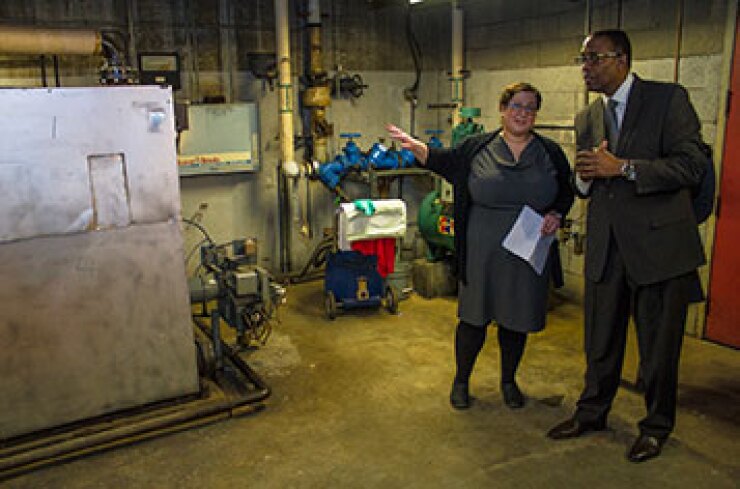
A new energy savings program could yield the struggling Philadelphia School District more than $300 million to chip away at $4.5 billion in deferred capital projects.
The nation's eighth-largest school district and Philadelphia City Council announced on March 20 a commitment to spearhead up to $345 million in energy efficiency projects.
The pilot program is backed by the Philadelphia Energy Authority as part of its $1 billion, 10-year energy efficiency campaign to upgrade city buildings, homes and businesses. Officials estimate that the collaboration between the district and energy authority has the potential to result in as much as $600 million in energy savings over 20 years.
"The School District of Philadelphia is self-funding a pilot program as a proof of concept to better project and accurately assess the financial savings from these types of projects," said Uri Monson, the district's chief financial officer. "Our hope is that the approach will yield savings that will directly impact our capital investments to modernize classrooms and improve school building conditions."
District and city officials explored increasing public and private investment into school buildings after a recent report detailed $4.5 billion in outstanding repairs needed at various facilities.
Prior to the partnership announcement, the school district and energy authority developed an energy performance contracting pilot program over six months that focused on three school buildings. Initial capital projects will be implemented this year in the three schools with enhancements to boilers, lighting, windows, roofs, heating systems and insulation, according to district officials.
"The purpose of this energy pilot program is to determine if targeted energy investments through capital investments in our schools achieve enough savings to fund recurring capital improvements," Dr. William R. Hite, superintendent of Philadelphia School District, said in a statement. "This type of investment in our facilities can have short- and long-term benefits — and the pilot program will allow us to go about this in a smart way."
City Council president Darrell Clarke and former Philadelphia Mayor Michael Nutter spearheaded the launch of the Philadelphia Energy Authority in 2010 as an independent municipal agency aimed at reducing energy consumption and expenses across the city. The authority launched an initiative in February 2016 called the Philadelphia Energy Campaign with the goal of targeting $1 billion toward energy efficiency and clean energy over the next 10 years.
"The school district's commitment to the process of identifying energy savings projects during capital planning is a big deal," Emily Schapira, executive director of the Philadelphia Energy Authority, said in a statement. "Many of the capital projects the district needs are also projects that will save energy."
The Philadelphia School District has faced credit woes in the last decade, blaming state-mandated support for a rising charter school population. A May 2016 audit from Pennsylvania Auditor General Eugene DePasquale showed a structural deficit of more than $500 million from 2010 to 2014.
The school district's bonds were downgraded five notches in December 2015 to Ba2 as a result of a new Moody's Investors Service rating approach to the Pennsylvania State Aid Intercept Program. Moody's revised its credit outlook from negative to stable last October, citing an improved financial position for 2017. Moody's analyst Orlie Prince said that the district has received a boost in the last year in the form of new revenue streams from sales taxes, grants and selling a school building.
"They are being innovative and are looking at all measures of cost savings," said Prince. "We are seeing fiscal improvement."
Despite the improved fiscal conditions, Prince noted that the district is hampered because the Pennsylvania General Assembly and Philadelphia City Council control its taxing authority. This has historically led to it relying heavily on state and federal subsidies that don't adequately cover expenses.
"They are working within their constraints," said Prince. "There is little flexibility."
Prince noted that while Pennsylvania's School Reform Commission has slowed its approvals of new charter schools in Philadelphia during the past few years, the issue remains a burden and will add to its facility repair requirements. Each Philadelphia School District student attending a charter school requires the district to pay the charter about $8,000, and$23,000 for special education students, according to Moody's.
Villanova University School of Business professor David Fiorenza credits the Philadelphia district with exploring new budget savings through an energy partnership similar to programs undertaken in some California school districts. He noted that a new Philadelphia beverage tax that began on Jan. 1will send the district money primarily for an expanded prekindergarten program, and therefore not make much of a dent in the school system's finances, making the new energy collaboration that much more vital.
"The Philadelphia School District is fiscally prudent to look at alternatives to raising taxes with a partnership that decreases expenses that will be used for much needed capital projects," said Fiorenza. "The first two months of collection of the newly instituted so called soda tax have been anemic at best and most of a school district's expenses are tied to unions with salary, health care and pension commitments, so costs savings is a wise decision."
Janney Capital Markets municipal analyst Alan Schankel said the energy partnership won't do much to aid the district's current fiscal woes, but will help establish future savings while also addressing capital needs. He credits city leaders for establishing the partnership given how important a role the schools play in the Philadelphia economy.
"This partnership will do little to address the school district's current operating challenges, but the district's collaboration with the Philadelphia Energy Authority will promote achievement of two important long range objectives – reducing future energy costs and financing part of the backlog of needed capital improvements," said Schankel, who attended the Philadelphia schools from third to 10th grade. "Among potential partners across Philadelphia's municipal government, no area is more of an ideal candidate than Philly schools, given the district's importance to the city's long term prosperity and its extensive city-wide facility footprint."





